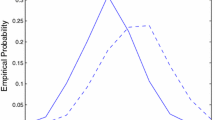Abstract
Quantile regression differs from traditional least-squares regression in that one constructs regression lines for the quantiles of the dependent variable in terms of the independent variable. In this paper we apply quantile regression to two problems in financial portfolio construction, index tracking and enhanced indexation. Index tracking is the problem of reproducing the performance of a stock market index, but without purchasing all of the stocks that make up the index. Enhanced indexation deals with the problem of out-performing the index. We present a mixed-integer linear programming formulation of these problems based on quantile regression. Our formulation includes transaction costs, a constraint limiting the number of stocks that can be in the portfolio and a limit on the total transaction cost that can be incurred. Numeric results are presented for eight test problems drawn from major world markets, where the largest of these test problems involves over 2000 stocks.

Similar content being viewed by others
References
Angelelli E, Mansini R and Speranza MG (2010). Kernel search: A general heuristic for the multi-dimensional knapsack problem. Computers & Operations Research 37 (11): 2017–2026.
Angelelli E, Mansini R and Speranza MG (2012). Kernel search: A new heuristic framework for portfolio selection. Computational Optimization and Applications 51 (1): 345–361.
Beasley JE (1990). OR-library: Distributing test problems by electronic mail. Journal of the Operational Research Society 41 (11): 1069–1072.
Beasley JE, Meade N and Chang T-J (2003). An evolutionary heuristic for the index tracking problem. European Journal of Operational Research 148 (3): 621–643.
Ben-Tal A and Nemirovski A (1998). Robust convex optimization. Mathematics of Operations Research 23 (4): 769–805.
Canakgoz NA and Beasley JE (2009). Mixed-integer programming approaches for index tracking and enhanced indexation. European Journal of Operational Research 196 (1): 384–399.
Chen C and Kwon RH (2012). Robust portfolio selection for index tracking. Computers & Operations Research 39 (4): 829–837.
Di Tollo G and Maringer D (2009). Metaheuristics for the index tracking problem. In: Geiger MJ, Habenicht W, Sevaux M and Sorensen K (eds). Metaheuristics in the Service Industry. Lecture Notes in Economics and Mathematical Systems, Springer: New York, NY, Vol. 624, pp 127–154.
Fabian CI, Mitra G, Roman D and Zverovich V (2011). An enhanced model for portfolio choice with SSD criteria: A constructive approach. Quantitative Finance 11 (10): 1525–1534.
Garcia F, Guijarro F and Moya I (2011). The curvature of the tracking frontier: A new criterion for the partial index tracking problem. Mathematical and Computer Modelling 54 (7–8): 1781–1784.
Ghandar A, Michalewicz Z, Zurbruegg R and Cheong C (2010). Index tracking fund enhancement using evolving multi-criteria fuzzy decision models. In: 2010 IEEE Congress on Evolutionary Computation. IEEE: New York, pp 1–8.
Guastaroba G and Speranza MG (2012). Kernel search: An application to the index tracking problem. European Journal of Operational Research 217 (1): 54–68.
Hao J and Naiman DQ (2007). Quantile Regression. Sage Publications: London, UK.
IBM ILOG Cplex Solver (2012). http://www-01.ibm.com/software/integration/optimization/cplex-optimizer/, accessed 21 April 2012.
Jeurissen R and van den Berg J (2008). Optimized index tracking using a hybrid genetic algorithm. In: 2008 IEEE Congress on Evolutionary Computation. IEEE: New York, pp 2327–2334.
Koenker R (2012). Package ‘quantreg’. http://cran.r-project.org/web/packages/quantreg/quantreg.pdf, accessed 21 April 2012.
Koenker R and Bassett G (1978). Regression quantiles. Econometrica 46 (1): 33–50.
Koenker R and Hallock KF (2001). Quantile regression. Journal of Economic Perspectives 15 (4): 143–156.
Krink T, Mittnik S and Paterlini S (2009). Differential evolution and combinatorial search for constrained index-tracking. Annals of Operations Research 172 (1): 153–176.
Lejeune MA (2012). Game theoretical approach for reliable enhanced indexation. Decision Analysis 9 (2): 146–155.
Lejeune MA and Samatlı-Paç G (2012). Construction of risk-averse enhanced index funds. INFORMS Journal on Computing, published online 27 November, doi: 10.1287/ijoc.1120.0533.
Li Q, Sun L and Bao L (2011). Enhanced index tracking based on multi-objective immune algorithm. Expert Systems with Applications 38 (5): 6101–6106.
Maringer D (2008). Constrained index tracking under loss aversion using differential evolution. In: Brabazon A and O'Neill M (eds). Natural Computing in Computational Finance: Studies in Computational Intelligence, Vol 100. Springer Verlag: Berlin, pp. 7–24.
Maringer D and Oyewumi O (2007). Index tracking with constrained portfolios. Intelligent Systems in Accounting, Finance and Management 15 (1–2): 57–71.
Markowitz H (1952). Portfolio selection. Journal of Finance 7 (1): 77–91.
Meade N and Beasley JE (2011). Detection of momentum effects using an index out-performance strategy. Quantitative Finance 11 (2): 313–326.
Metaxiotis K and Liagkouras K (2012). Multiobjective evolutionary algorithms for portfolio management: A comprehensive literature review. Expert Systems with Applications 39 (14): 11685–11698.
Mezali H and Beasley JE (2012). Index tracking with fixed and variable transaction costs. Working paper, available from the second author at Mathematical Sciences, Brunel University, Uxbridge, UK. To appear in Optimization Letters.
Roman D, Darby-Dowman K and Mitra G (2006). Portfolio construction based on stochastic dominance and target return distributions. Mathematical Programming 108 (2–3): 541–569.
Roman D, Mitra G and Zviarovich V (2011). Enhanced indexation based on second-order stochastic dominance. Working paper, available from the first author at Mathematical Sciences, Brunel University, Uxbridge, UK.
Ruiz-Torrubiano R and Suarez A (2009). A hybrid optimization approach to index tracking. Annals of Operations Research 166 (1): 57–71.
Storn R and Price K (1997). Differential evolution—A simple and efficient heuristic for global optimization over continuous spaces. Journal of Global Optimization 11 (4): 341–359.
Tabata Y and Takeda E (1995). Bicriteria optimization problem of designing an index fund. Journal of the Operational Research Society 46 (8): 1023–1032.
Van Montfort K, Visser E and van Draat LF (2008). Index tracking by means of optimized sampling. The Journal of Portfolio Management 34 (2): 143–151.
Wang M, Xu C, Xu F and Xue H (2012). A mixed 0–1 LP for index tracking problem with CVaR risk constraints. Annals of Operations Research 196 (1): 591–609.
Yu K, Lu Z and Stander J (2003). Quantile regression: Applications and current research areas. The Statistician 52 (3): 331–350.
Author information
Authors and Affiliations
Corresponding author
Rights and permissions
About this article
Cite this article
Mezali, H., Beasley, J. Quantile regression for index tracking and enhanced indexation. J Oper Res Soc 64, 1676–1692 (2013). https://doi.org/10.1057/jors.2012.186
Received:
Accepted:
Published:
Issue Date:
DOI: https://doi.org/10.1057/jors.2012.186




